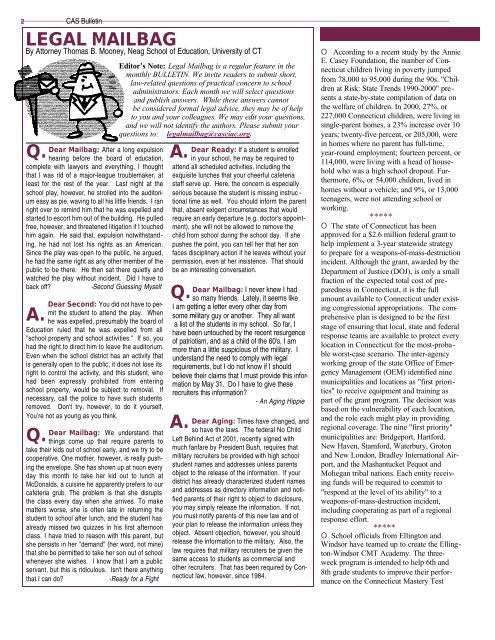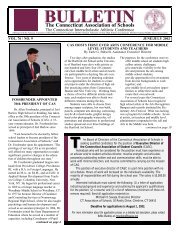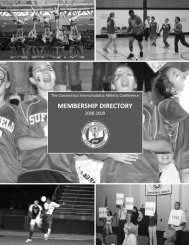BULLETIN BULLETIN - www.casciac.org!!
BULLETIN BULLETIN - www.casciac.org!!
BULLETIN BULLETIN - www.casciac.org!!
You also want an ePaper? Increase the reach of your titles
YUMPU automatically turns print PDFs into web optimized ePapers that Google loves.
2<br />
CAS Bulletin<br />
LEGAL MAILBAG<br />
By Attorney Thomas B. Mooney, Neag School of Education, University of CT<br />
Q.<br />
Dear Mailbag: After a long expulsion<br />
hearing before the board of education,<br />
complete with lawyers and everything, I thought<br />
that I was rid of a major-league troublemaker, at<br />
least for the rest of the year. Last night at the<br />
school play, however, he strolled into the auditorium<br />
easy as pie, waving to all his little friends. I ran<br />
right over to remind him that he was expelled and<br />
started to escort him out of the building. He pulled<br />
free, however, and threatened litigation if I touched<br />
him again. He said that, expulsion notwithstanding,<br />
he had not lost his rights as an American.<br />
Since the play was open to the public, he argued,<br />
he had the same right as any other member of the<br />
public to be there. He then sat there quietly and<br />
watched the play without incident. Did I have to<br />
back off? -Second Guessing Myself<br />
Dear Second: You did not have to permit<br />
the student to attend the play. When<br />
A. he was expelled, presumably the board of<br />
Education ruled that he was expelled from all<br />
"school property and school activities." If so, you<br />
had the right to direct him to leave the auditorium.<br />
Even when the school district has an activity that<br />
is generally open to the public, it does not lose its<br />
right to control the activity, and this student, who<br />
had been expressly prohibited from entering<br />
school property, would be subject to removal. If<br />
necessary, call the police to have such students<br />
removed. Don't try, however, to do it yourself.<br />
You're not as young as you think.<br />
Q.<br />
Dear Mailbag: We understand that<br />
things come up that require parents to<br />
take their kids out of school early, and we try to be<br />
cooperative. One mother, however, is really pushing<br />
the envelope. She has shown up at noon every<br />
day this month to take her kid out to lunch at<br />
McDonalds, a cuisine he apparently prefers to our<br />
cafeteria grub. The problem is that she disrupts<br />
the class every day when she arrives. To make<br />
matters worse, she is often late in returning the<br />
student to school after lunch, and the student has<br />
already missed two quizzes in his first afternoon<br />
class. I have tried to reason with this parent, but<br />
she persists in her "demand" (her word, not mine)<br />
that she be permitted to take her son out of school<br />
whenever she wishes. I know that I am a public<br />
servant, but this is ridiculous. Isn't there anything<br />
that I can do? -Ready for a Fight<br />
Editor’s Note: Legal Mailbag is a regular feature in the<br />
monthly <strong>BULLETIN</strong>. We invite readers to submit short,<br />
law-related questions of practical concern to school<br />
administrators. Each month we will select questions<br />
and publish answers. While these answers cannot<br />
be considered formal legal advice, they may be of help<br />
to you and your colleagues. We may edit your questions,<br />
and we will not identify the authors. Please submit your<br />
questions to: legalmailbag@<strong>casciac</strong>.<strong>org</strong>.<br />
A.<br />
Dear Ready: If a student is enrolled<br />
in your school, he may be required to<br />
attend all scheduled activities, including the<br />
exquisite lunches that your cheerful cafeteria<br />
staff serve up. Here, the concern is especially<br />
serious because the student is missing instruc -<br />
tional time as well. You should inform the parent<br />
that, absent exigent circumstances that would<br />
require an early departure (e.g. doctor's appointment),<br />
she will not be allowed to remove the<br />
child from school during the school day. If she<br />
pushes the point, you can tell her that her son<br />
faces disciplinary action if he leaves without your<br />
permission, even at her insistence. That should<br />
be an interesting conversation.<br />
Q.<br />
Dear Mailbag: I never knew I had<br />
so many friends. Lately, it seems like<br />
I am getting a letter every other day from<br />
some military guy or another. They all want<br />
a list of the students in my school. So far, I<br />
have been untouched by the recent resurgence<br />
of patriotism, and as a child of the 60's, I am<br />
more than a little suspicious of the military. I<br />
understand the need to comply with legal<br />
requirements, but I do not know if I should<br />
believe their claims that I must provide this information<br />
by May 31. Do I have to give these<br />
recruiters this information?<br />
- An Aging Hippie<br />
A.<br />
Dear Aging: Times have changed, and<br />
so have the laws. The federal No Child<br />
Left Behind Act of 2001, recently signed with<br />
much fanfare by President Bush, requires that<br />
military recruiters be provided with high school<br />
student names and addresses unless parents<br />
object to the release of the information. If your<br />
district has already characterized student names<br />
and addresses as directory information and notified<br />
parents of their right to object to disclosure,<br />
you may simply release the information. If not,<br />
you must notify parents of this new law and of<br />
your plan to release the information unless they<br />
object. Absent objection, however, you should<br />
release the information to the military. Also, the<br />
law requires that military recruiters be given the<br />
same access to students as commercial and<br />
other recruiters. That has been required by Connecticut<br />
law, however, since 1984.<br />
O According to a recent study by the Annie<br />
E. Casey Foundation, the number of Connecticut<br />
children living in poverty jumped<br />
from 78,000 to 95,000 during the 90s. "Children<br />
at Risk: State Trends 1990-2000" presents<br />
a state-by-state compilation of data on<br />
the welfare of children. In 2000, 27%, or<br />
227,000 Connecticut children, were living in<br />
single-parent homes, a 23% increase over 10<br />
years; twenty-five percent, or 205,000, were<br />
in homes where no parent has full-time,<br />
year-round employment; fourteen percent, or<br />
114,000, were living with a head of household<br />
who was a high school dropout. Furthermore,<br />
6%, or 54,000 children, lived in<br />
homes without a vehicle; and 9%, or 13,000<br />
teenagers, were not attending school or<br />
working.<br />
*****<br />
O The state of Connecticut has been<br />
approved for a $2.6 million federal grant to<br />
help implement a 3-year statewide strategy<br />
to prepare for a weapons-of-mass-destruction<br />
incident. Although the grant, awarded by the<br />
Department of Justice (DOJ), is only a small<br />
fraction of the expected total cost of preparedness<br />
in Connecticut, it is the full<br />
amount available to Connecticut under existing<br />
congressional appropriations. The comprehensive<br />
plan is designed to be the first<br />
stage of ensuring that local, state and federal<br />
response teams are available to protect every<br />
location in Connecticut for the most-probable<br />
worst-case scenario. The inter-agency<br />
working group of the state Office of Emergency<br />
Management (OEM) identified nine<br />
municipalities and locations as "first priorities"<br />
to receive equipment and training as<br />
part of the grant program. The decision was<br />
based on the vulnerability of each location,<br />
and the role each might play in providing<br />
regional coverage. The nine "first priority"<br />
municipalities are: Bridgeport, Hartford,<br />
New Haven, Stamford, Waterbury, Groton<br />
and New London, Bradley International Airport,<br />
and the Mashantucket Pequot and<br />
Mohegan tribal nations. Each entity receiving<br />
funds will be required to commit to<br />
"respond at the level of its ability" to a<br />
weapons-of-mass-destruction incident,<br />
including cooperating as part of a regional<br />
response effort.<br />
*****<br />
O School officials from Ellington and<br />
Windsor have teamed up to create the Ellington-Windsor<br />
CMT Academy. The threeweek<br />
program is intended to help 6th and<br />
8th grade students to improve their performance<br />
on the Connecticut Mastery Test









